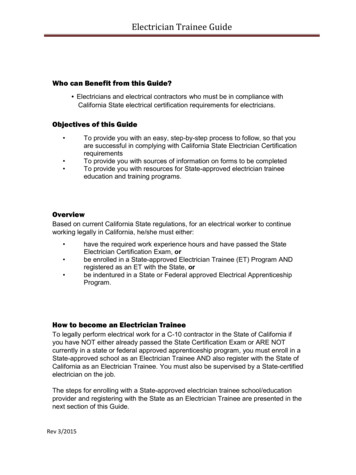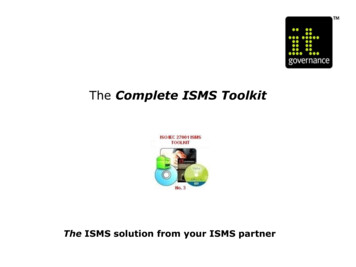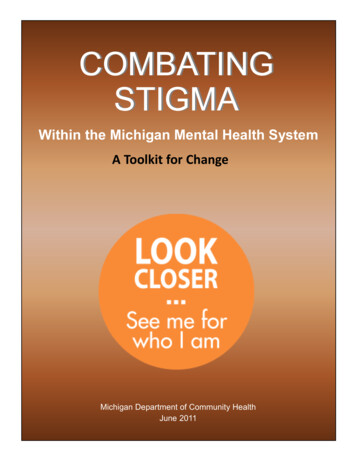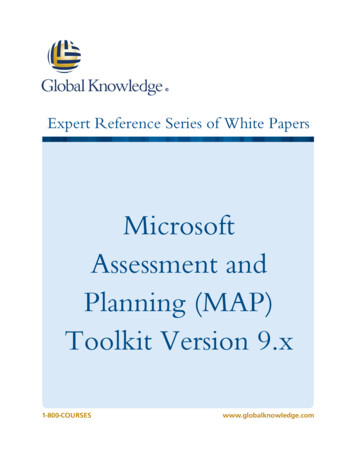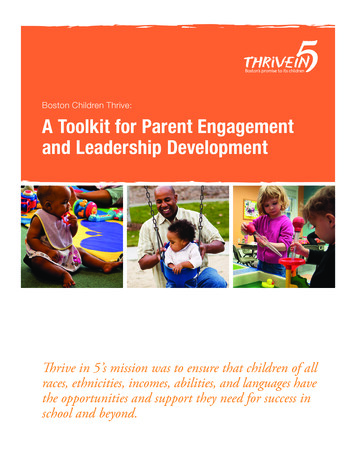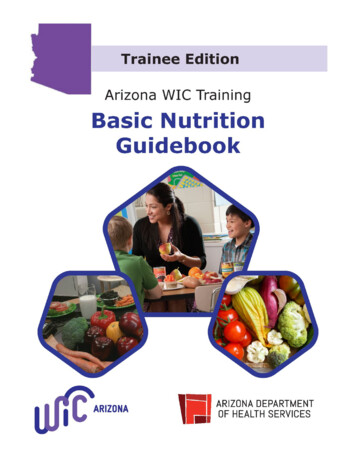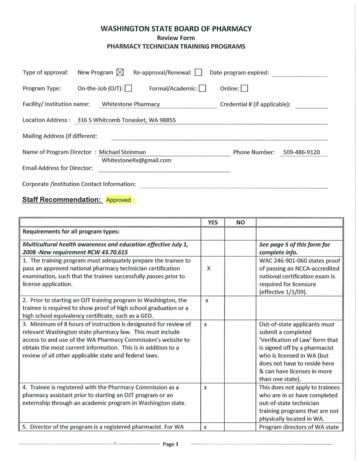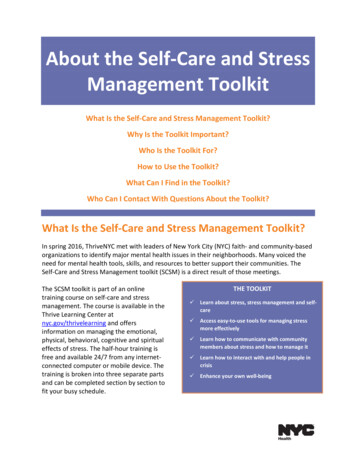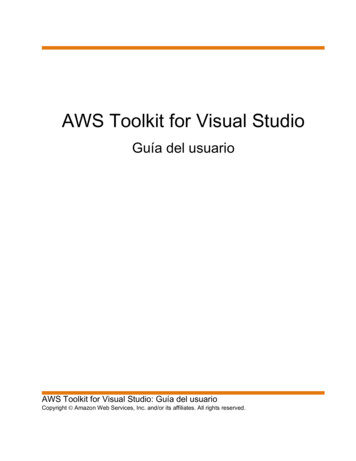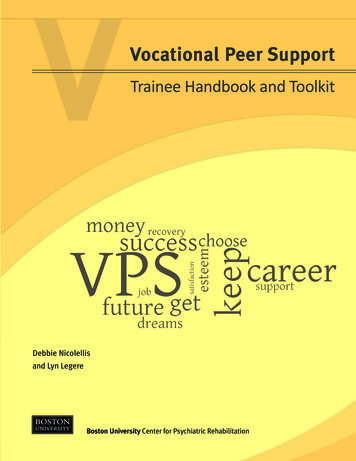
Transcription
VVocational Peer SupportTrainee Handbook and ToolkitDebbie Nicolellisand Lyn LegereBoston University Center for Psychiatric Rehabilitation
Vocational Peer Support Training Program Trainee Handbook and Toolkit 2015 Trustees of Boston UniversityCenter for Psychiatric Rehabilitation940 Commonwealth Avenue WestBoston, MA 02215http://cpr.bu.edu/Suggested citation:Nicolellis, D. & Legere, L. (2015). Vocational Peer Support Training Program: Trainee Handbookand Toolkit. Boston, MA: Boston University Center for Psychiatric Rehabilitation.The production of the Vocational Series in Psychiatric Rehabilitation and Recovery was directedby Marianne Farkas.The contents of this publication were developed under a grant with funding from the NationalInstitute on Disability, Independent Living, and Rehabilitation Research, and from the Center forMental Health Services Substance Abuse and Mental Health Services Administration, UnitedStates Department of Health and Human Services (NIDILRR grant 90RT5033). NIDILRR is aCenter within the Administration for Community Living (ACL), Department of Health andHuman Services (HHS). The contents of this project do not necessarily represent the policy ofNIDILRR, ACL, HHS, and you should not assume endorsement by the Federal Government.ISBN: 978-1-878512-63-52 2015 Trustees of Boston University, Center for Psychiatric Rehabilitation
Vocational Peer Support Training Program Trainee Handbook and ToolkitAcknowledgmentsThis work has been influenced by many. The invaluable work of Bill Anthony, Mikal Cohen, MarianneFarkas, Karen Danley, and our colleagues at the Boston University Center for Psychiatric Rehabilitationhave provided a robust basis for this work. The evidence-based Psychiatric Rehabilitation Process Modeland Training Technology provided a foundation for this curriculum, as did the “Choose-Get-Keep”supported employment framework and process, which have been adapted here for use in peer practice.This work was informed and inspired by the various wonderful certified peer support training curriculafrom around the country.We cannot thank the Transformation Center in Boston, MA, and its Executive Director, Deborah Delman,enough for their generous and instrumental support of the development and piloting of this curriculum.We celebrate the collaboration between peer and academic organizations, and we are grateful to havehad the opportunity to bring to fruition an aspiration of ours, that of joining employment support andpeer support to better serve people in recovery.Our working advisory group has had a great impact on us and on this curriculum. We are moved byShery Mead’s reminders in Intentional Peer Support to “learn with,” “scaffold,” and to “stay peer,” andwe appreciate her support to echo those sentiments throughout this curriculum. Larry Fricks of theAppalachian Training Group helped us to find our center by encouraging us to concentrate on thebeauty and power of Choose-Get-Keep. The encouragement of Peggy Swarbrick of Community SupportPrograms of New Jersey to add in a Social Security Work Incentives component has transformed thefinal training package. Lori Ashcraft of Recovery Innovations taught us much about the role that genuinecaring and wellbeing plays in peer support and vocational recovery. Lastly, we thank Lori DiGalbo for herthoughts on ways that we could join vocational peer support and vocational rehabilitation systems.We could not have gotten this curriculum off the ground without the generous commitment of time,energy, and feedback by the many peers who have allowed us to learn with them about vocational peersupport. Our pre-pilot group from around Massachusetts helped us to initially think about theintersection of employment and peer support, the Pioneer Class in Boston, MA, helped us to work onour first drafts, and the Recovery Academy class in Grand Rapids, MI, helped us to understand the roleof current work for peers learning about VPS; and to all of you, we are ever grateful.And to those who worked with us for several years while utilizing VPS skills and tools in their practiceevery day, we tip our hats to you. The Peer Specialist Team at Advocates, Inc., under the direction ofKeith Scott, the Recovery Coaches of Recovery Innovations in Phoenix, AZ, under the leadership of LoriAshcraft, Gene Johnson, and Christopher Magee; and finally, the staff at Promise Recovery Networkunder the guidance of Cherene Allen-Caraco have made more than a substantive contribution. By usingVPS in your work, and talking to us month after month, you have offered us the kind of guidance thatonly the true experts can extend.Finally, we wish to thank those who provided funding, the National Institute on Disability, IndependentLiving, and Rehabilitation Research (NIDILRR) and the Center for Mental Health Services (CMHS) underthe Substance Abuse and Mental Health Services Administration (SAMHSA). We are grateful for yourvision of, and unfaltering commitment to, improving employment outcomes for people diagnosed withpsychiatric disabilities.Debbie Nicolellis, Lyn Legere 2015 Trustees of Boston University, Center for Psychiatric Rehabilitation3
Vocational Peer Support Training Program Trainee Handbook and ToolkitHow To Use This MaterialThe material within these pages are designed to be utilized within a classroom-trainingenvironment, but may be used for independent study as desired.Here is what you will find within the Modules in this workbook:1. Each Module has a different content focus2. For ease, each Module has a “Content Guide” with a list of what is contained within3. Overviews of each content area4. Classroom Discussion Questions5. Information about skills you will need to work with Vocational Peer Support6. Examples of the process7. Classroom Practice Exercises8. Discussion Prompts for use in conversations with peers or to facilitate use of Tools9. Tools to support explorations and decision-making in your work with peers10. Tips and Pitfalls to Watch out forFeel free to write in this book, to take notes, mark down answers for exercises and discussions,and even to doodle. This workbook is yours. You will receive a clean copy of the Tools,Discussion Prompts, and even some of the main points from each of the Modules in the VPSToolkit. Once you start using the VPS Toolkit, make copies of the Tools to work with eachperson.4 2015 Trustees of Boston University, Center for Psychiatric Rehabilitation
Vocational Peer Support Training Program Trainee Handbook and ToolkitCourse Introduction:VPS Training Program: The Basic FactsVPS Training Program: An advanced specialization for peer specialists.Goal of the VPS Training: To support peer specialists who wish to add information, skills, andtools needed to support vocational recovery.VPS Teaching MethodsIn the VPS Training, you might expect the following: Interactive teaching Lots of discussion A focus on skills Exercises to enhance experience with new tools Community Learning outside of class, to hone new skills in your work 2015 Trustees of Boston University, Center for Psychiatric Rehabilitation5
Vocational Peer Support Training Program Trainee Handbook and ToolkitVPS Training TopicsThe table below lists the training topics covered in the VPS Training, by each Module.6Module 1Overview of the Training ProgramVocational Recovery & Vocational Peer SupportModule 2Partnering to Support Vocational RecoveryModule 3Building Motivational FoundationsModule 4Supporting Choice in Work and CareerModule 5Scaffolding Getting Into Jobs and SchoolModule 6Keeping Work and SchoolModule 7Coordinating with Employment Service ProvidersModule 8Researching InformationModule 9Supporting People to Work While on Benefits (Optional 1-day Module)Module 10Using the Scaffolding: How do we keep this going? 2015 Trustees of Boston University, Center for Psychiatric Rehabilitation
Vocational Peer Support Training Program Trainee Handbook and ToolkitWhat we will we walk away with?InformationResourcesSkill PracticeCommunity LearningTools to support people in their efforts to moveforward in employment, education, andvocational recovery.Discussion:What are you hoping to get out of this program?What do the people you work with say about employment and educational goals? 2015 Trustees of Boston University, Center for Psychiatric Rehabilitation7
Vocational Peer Support Training Program Trainee Handbook and ToolkitModule 1Vocational RecoveryandVocational Peer Support8 2015 Trustees of Boston University, Center for Psychiatric Rehabilitation
Module 1 Vocational Recovery & Vocational Peer SupportWhat to Expect in Module 1The Big Question ofModule 1 What do I need to know about VPS andVocational Recovery as we start thistraining program?Module 1 will introduce you to the concepts and general practice of Vocational Peer Support(VPS), and the context of Vocational Recovery. You will find in Module 1 descriptions ofconcepts, examples to illustrate processes, classroom exercises, and tools for your ongoingreference.Module 1 Table of ContentsPage1.1Vocational Recovery and Vocational Peer Support101.2Review of Peer Support Principles111.3What is Vocational Recovery?121.4So what are people up against when thinking about work?131.5Vocational Peer Support: Mission141.6Vocational Peer Support: Values151.7A Snapshot of VPS Activities161.8“Scaffolding” in Vocational Peer Support171.9Tool: “Scaffolding” in Peer Support181.10Module 1 Summary Exercise19 2015 Trustees of Boston University, Center for Psychiatric Rehabilitation9
Vocational Peer Support Training Program Trainee Handbook and Toolkit1.1 Vocational Recovery and Vocational Peer SupportIn Module 1: we will learn Information about: What is Vocational Recovery?What is Vocational Peer Support?What is Scaffolding in VPS?Why look at work? Studies report that only 15% - 33% of people with psychiatric disabilities are working. Under-employment is a big problem: People with disabilities may work fewer hours, andeven get paid less, than people without disabilities. HOWEVER: Research shows that most people with lived experience want to work –about 70% say they want to work!Assist people to decide IF they want to work,What is thepeer supportrole insupportingvocationalrecovery?Support people to figure out what they want to dofor work or career,Aid in the gathering of resources,Support people to use their strengths,And help people to get into and keep the kind ofwork they really want.10 2015 Trustees of Boston University, Center for Psychiatric Rehabilitation
our first drafts, and the Recovery Academy class in Grand Rapids, MI, helped us to understand the role of current work for peers learning about VPS; and to all of you, we are ever grateful. And to those who worked with us for several years while utilizing VPS skills and t
